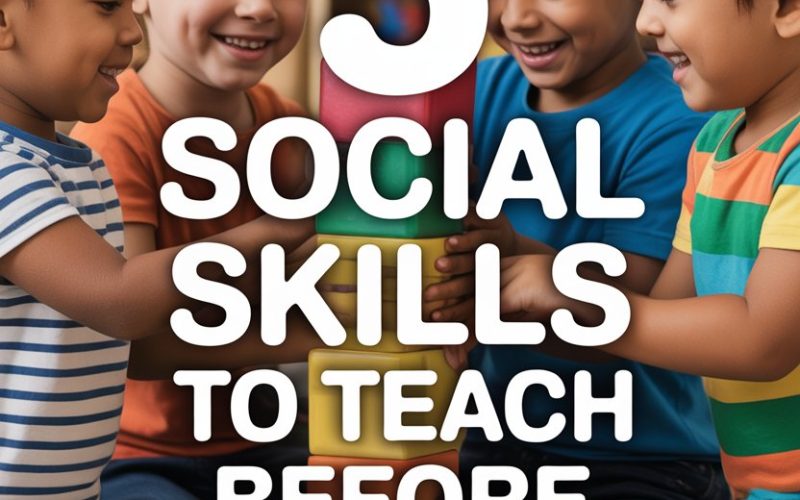Preschool is a wild ride. One minute your little one is happily squishing playdough, the next they’re locked in a prehistoric struggle over a plastic dinosaur with a child named Max.
Social skills? They’re the secret sauce that can make these moments less… Jurassic.
If you’re staring down the barrel of your child’s first preschool drop-off and wondering if you’ve covered everything except maybe algebra, this one’s for you.
Here are five social skills to help your child shine (or at least survive) in the world of cubbies, snack time politics, and glitter glue.
1. Saying Hello and Goodbye (Without Melting Into a Puddle)
You wouldn’t think an innocent “hi” could trigger full-body paralysis, but for many kids, it’s like being asked to recite Shakespeare on a tightrope.
Greetings and farewells are the bookends of preschool social life, and mastering them sets the tone for positive interactions all day long.
For some children, waving or saying “hello” comes naturally. Others need a bit more practice.
Try role-playing at home—pretend you’re different people (bonus points for dodgy accents) and greet each other at the door. Even stuffed animals can get in on the act.
If your child is more likely to hide behind your knees than offer a cheery “bye,” that’s perfectly normal. Gently encourage them to try, even if it’s just a wave or a smile.
Social workers point out that what matters is the attempt at connection, not the perfection of the delivery.
After all, no preschool teacher expects Oscar-worthy performances. Just a hint of willingness to participate goes a long way.
2. Sharing and Taking Turns (Without the Dramatic Shakespearean Monologue)
Nothing tests a child’s moral fibre like a communal snack or a coveted red truck. Sharing is the Mount Everest of preschool social skills.
It’s not about convincing your child to hand over their most prized possession forever (let’s not be ridiculous). It’s about starting with manageable, bite-sized steps.
Play games where you take turns—think simple board games, rolling a ball back and forth, even going down a slide. Narrate the process: “It’s your turn, now it’s my turn.”
This builds the idea that waiting isn’t an eternal sentence; it actually ends.
If your child launches into a soliloquy about the injustice of sharing, validate their feelings. “You really want to keep the red crayon. It can be hard to wait.”
Empathy doesn’t mean handing over the crayon forever but acknowledges their perspective—a powerful step in itself.
Research from the University of Pittsburgh suggests that strong social skills in sharing and cooperation can predict later academic and social success, more so than the ability to recite the alphabet backwards or identify a hexagon at twenty paces.
Try pointing out when you share things in real life—a muffin with your partner, a queue at the supermarket. Kids love to catch grownups “playing fair,” and they learn a lot by watching you.
3. Asking for Help (Instead of Screaming Like a Howler Monkey)
There’s a certain charm to toddler independence until you notice someone’s trying to wear their trousers as a hat. Knowing when and how to ask for help is a life skill, not a sign of weakness (despite what some stubborn three-year-olds believe).
Try practicing phrases such as, “Can you help me, please?” or, for the especially shy, “Help, please?” Turn it into a game—pretend you’re both lost in the jungle and need to ask for help from the jungle guide (that’s you, by the way).
Roleplay works wonders for kids who clam up in unfamiliar situations. You might be the lunch lady one day, a friendly teacher the next.
The point isn’t to rehearse every possible scenario, but to show your child that adults at preschool are there to support, not just to enforce naptime.
Experts at Zero to Three highlight that developing help-seeking behaviours builds both confidence and resilience. The payoff? Kids are less likely to implode when the juice box proves impossible to open.
4. Expressing Emotions with Words (Instead of Chucking Blocks)
Preschoolers have big feelings in little bodies. When words fail, wooden blocks take flight. Learning to name and explain emotions is like giving your child a social superpower (cape optional).
Start by labelling emotions in everyday life: “You look frustrated because your tower fell down.” Picture books can be brilliant for this; characters with exaggerated expressions make it easier to talk about feelings.
Try books like “The Color Monster” or any story where someone’s grumpy face could curdle yoghurt.
If your child’s response to frustration is a dramatic flop on the floor, stay calm and model the language you want: “You’re really angry right now. That’s tough.”
Avoid punishing strong emotions; focus on acceptable ways to express them—stomping feet, squeezing a pillow, drawing a picture.
Practicing “I feel…” sentences helps, too: “I feel sad when you take my toy.”
It may sound basic, but it’s the foundation of empathy and assertiveness, two of the most valuable chips in the preschool social poker game.
5. Listening and Following Basic Directions (Without Turning Into a Mini Dictator)
Before you start wistfully dreaming of a child who listens the first time, let’s lower the bar a smidge.
Preschool success depends less on perfect obedience, more on a child’s ability to pause, listen, and attempt to follow simple instructions.
Turn listening into a game. “Simon Says” is an oldie for good reason—kids tune in, focus on your words, and resist the urge to jump the gun.
If “Simon Says” brings on eye rolls (from you or your child), try a scavenger hunt or a silly dance-off where they have to wait for your signal.
Break instructions into bite-sized chunks. “Put your shoes by the door” works better than “Put your shoes away, wash your hands, and then come sit at the table.” Praise any effort, not just the end result.
Researchers have found that children who practice listening and following instructions tend to adjust more smoothly to the preschool routine.
Harvard’s Center on the Developing Child notes that these executive function skills set the stage for learning, impulse control, and positive peer relationships—not just surviving circle time.
And if all else fails? There’s always the time-honoured tradition of bribery (kidding! Mostly).
Sending Your Child Off with Confidence
No one expects a four-year-old to be a paragon of social grace. These skills take time, repetition, and a large helping of patience (and probably coffee).
Try a few playful activities each week. Celebrate baby steps—a wave here, a “please” there.
Preschool isn’t about perfection; it’s about learning, laughing, and probably catching a cold or two. With these five skills in their toolkit, your child will walk (or skip, or gallop) into the classroom with a little more confidence.
And you? You can finally celebrate making it through drop-off without needing a tissue or a strong cuppa.
For today, that’s a win.




